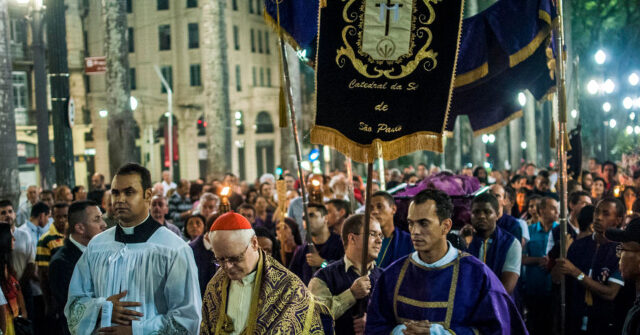Catholics across Latin America are observing this year’s Good Friday by participating in numerous processions and activities, honoring their respective countries’ Catholic traditions, some of which stand out as unique among themselves.
Latin America is home to a significant number of the world’s Catholics. According to the Catholic News Agency, over 40 percent of the world’s population of over 1.4 billion Catholics reside in the region. A study conducted by the Chile-based firm Latinobarómetro in 2024 found that 54 percent of Latin Americans identify as Catholic.
Every year, Catholics mark Holy Week to commemorate the Passion, death, and resurrection of Jesus Christ. As it is a moveable observance, this year’s Holy Week will run from April 13 (Palm Sunday) to April 20 (Easter Sunday). On Good Friday, Catholics commemorate the crucifixion and death of Jesus Christ through a series of traditions, many of them processions — most notably, the Via Crucis (“Stations of the Cross”) which commemorates Jesus Christ’s last day on Earth prior to resurrection.
In Caracas, the capital city of Venezuela, Catholic faithful participate in a pilgrimage across seven of the city’s churches on Good Friday to honor the Passion of Jesus Christ. The pilgrimage historically involves visiting seven churches located in the city’s center on foot, starting at the Our Lady of La Candelaria church, and finishing at Caracas Cathedral, although Catholic Faithful may honor the tradition by visiting seven temples of their choosing, or on the evening of Maundy Thursday instead.
Another highly important and centuries-old Holy Week tradition in Caracas is the Nazarene of Saint Paul. Every Holy Wednesday, thousands of Catholic faithful, often wearing purple robes or clothing, participate in a procession honoring Jesus Christ carrying the cross, praying for health, and expressing gratitude for miracles received.
In Brazil, the Latin American country with the largest number of Catholics in the region, one of its most emblematic Good Friday traditions takes place in the city of Nova Jerusalem, Pernambuco. Hundreds of actors participate in a live play of the Passion of the Christ. Local media reported on Friday that the live action play will have additional showings up until Easter Sunday this year.
In the Brazilian state of Goiás, local faithful participate in the Dead Lord every Good Friday to honor how Jesus Christ died, was taken down from the cross by his disciples, and carried to his tomb. The faithful carry a coffin representing Jesus under a purple pallium and the platform of Our Lady of Sorrows, with some individuals representing personalities from the Old Testament of the Bible such as Abraham and Isaac.
In countries such as Ecuador and Guatemala, Catholics participate in several processions, some of which combine local ancestral traditions. In Ecuador, the Jesus the Almighty procession takes place every Good Friday in the capital city of Quito. Cucuruchos, men donning purple robes who seek for atonement for their sins and plea for repentance, are accompanied by Veronicas, women who represent the pious women who accompanied Jesus on his way of the cross. The name honors Veronica, the woman who offered Jesus a cloth to wipe his face as he carried the cross.
In the Guatemalan city of Antigua, locals set up a carpet made entirely from vegetables every Good Friday, a practice that recalls Mayan traditions and which is now synonymous with Holy Week in the city. The tradition first started as an offering of gratitude from a man known as “Mister Acajabón.”
The man, who was born in 1940 and died in 2012, was left paralytic after a disease, but miraculously recovered after visiting the Nazarene of the Mercy every day. The tradition is now maintained by Acajabón’s descendants. Locals in Antigua also prepare elaborate, colorful carpets made of sawdust across the city’s street to honor the processions that pass over them.
Although most of Latin America can freely exercise their religious traditions and Catholic faith during Holy Week, that is not the case in Nicaragua, ruled by communist dictator Daniel Ortega and his wife and “Co-President” Rosario Murillo.
Since 2018, the dictatorial couple has waged a brutal persecution campaign against Christianity in Nicaragua, and all public Holy Week processions remain prohibited since 2023 under penalty of arrest. Despite the prohibition and relentless persecution of the Nicaraguan Catholic Church, Ortega, through his wife Rosario Murillo, has hijacked Christianity and delivered daily “religious” messages in state media during Holy Week.
A similar case occurs in Cuba, where the communist regime has prohibited several Holy Week processions and activities from taking place in the capital city of Havana and in other Cuban cities such as Trinidad.
Christian K. Caruzo is a Venezuelan writer and documents life under socialism. You can follow him on Twitter here.
Read the full article here
